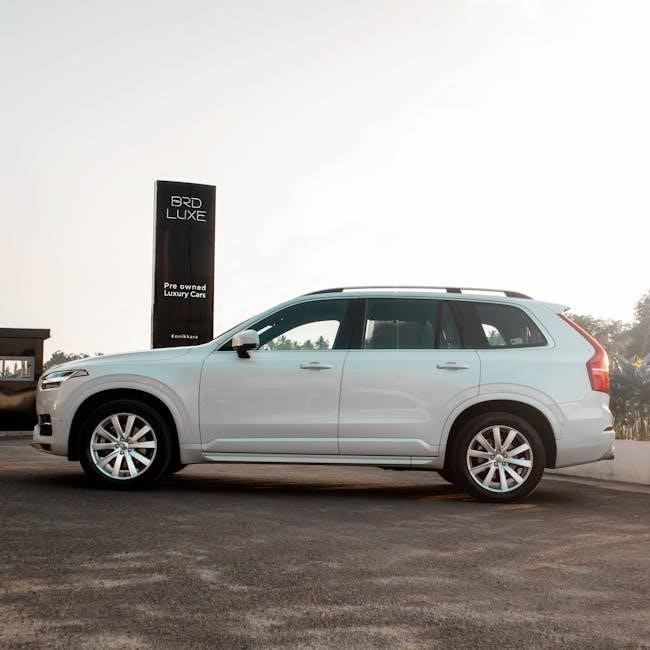Welcome to the world of pre-owned luxury car buying! This guide helps beginners navigate the process, offering insights into affordability, quality, and making informed decisions.
Understanding the Pros and Cons of Pre-Owned Luxury Cars
Buying a pre-owned luxury car offers affordability and access to high-end features at a lower cost. Pros include significant depreciation savings, as luxury cars lose value quickly, and certified pre-owned (CPO) programs often provide warranties. However, cons like higher maintenance costs, potential hidden repairs, and limited customization options exist. Additionally, insurance premiums may be higher. Weighing these factors helps buyers make informed decisions aligned with their budget and lifestyle needs.

Setting a Budget for Your Pre-Owned Luxury Car
Assess your financial situation to set a realistic budget, considering purchase price, financing, insurance, and maintenance costs to ensure affordability and long-term satisfaction.
How to Determine Your Price Range
Start by assessing your financial situation, including savings, income, and debt. Research market values of desired models using pricing guides like Kelley Blue Book. Consider additional costs such as financing fees, insurance, and maintenance. Set a realistic range by evaluating your comfort level with monthly payments and long-term financial commitments. Avoid stretching your budget too thin, as luxury cars often come with higher upkeep expenses. Tools like online calculators can help refine your price range effectively.
Considering Financing Options
Exploring financing options is crucial for affording a pre-owned luxury car. Compare rates from banks, credit unions, and online lenders to find the best deal. Dealerships often offer financing plans, but verify the terms and interest rates. Consider your credit score, as it impacts loan approval and rates. Pre-approval can strengthen your negotiating position. Additionally, review warranty coverage included in financing packages to ensure long-term protection. Prioritize transparent terms and avoid hidden fees to make your purchase financially sustainable.

Researching Luxury Car Models
Researching luxury car models involves evaluating reliability, performance, and features. Compare makes and models, focusing on history, reviews, and market value to make an informed decision.
Popular Luxury Car Brands for Pre-Owned Purchases
Popular luxury car brands for pre-owned purchases include BMW, Mercedes-Benz, Audi, and Lexus, known for their durability and lower depreciation. These brands offer a blend of performance, comfort, and advanced features, making them highly sought after. Certified Pre-Owned (CPO) programs from these brands provide added warranties and inspections, reducing risks. Other notable brands like Porsche and Land Rover are also popular, though they may come with higher maintenance costs. Researching these brands helps buyers find reliable luxury vehicles that fit their budget and lifestyle.
Key Features to Look for in a Pre-Owned Luxury Car
When evaluating a pre-owned luxury car, focus on maintenance history, collision repairs, and advanced features like infotainment systems and driver-assistance technologies. Check for wear and tear on interiors, such as leather upholstery and trim. Ensure all electronic systems function properly and verify the condition of tires and brakes. Additionally, look for certifications from dealerships or third-party inspectors, as these often indicate a well-maintained vehicle. Prioritize models with low mileage and a clean service record for long-term reliability and satisfaction.
Inspecting and Test Driving a Pre-Owned Luxury Car

Inspecting and test driving a pre-owned luxury car involves evaluating both exterior and interior condition, checking for damage or wear, and assessing performance and comfort during the drive.
What to Look for in a Pre-Owned Car Inspection
When inspecting a pre-owned luxury car, examine the exterior for dents, rust, or paint damage. Check the interior for stains, odors, or wear on upholstery. Inspect the engine and undercarriage for leaks or damage. Review the tires and brakes for condition and wear. Look for any signs of accident repairs or flood damage. Ensure all electronic features function properly. Check the mileage and maintenance history to confirm the car has been well-cared for. Consider hiring a mechanic for a detailed report.

Test Drive Tips for Evaluating Performance and Comfort
- Assess acceleration by driving on a straight, open road to ensure smooth power delivery.
- Check handling on curves to gauge responsiveness and stability.
- Evaluate comfort by adjusting seats, testing heating/cooling, and ensuring minimal noise.
- Test features like infotainment, navigation, and driver-assistance systems.
- Drive on various road types to assess ride quality and performance;
- Listen for unusual noises and vibrations during acceleration or braking;
- Test braking performance by applying brakes firmly at moderate speeds.
- Ensure proper alignment by driving straight without steering adjustment.
Understanding Certification and Warranties
Certification ensures pre-owned luxury cars meet strict standards, often through inspections. Warranties provide post-purchase protection, covering repairs and parts for a set period or mileage.
Certified Pre-Owned (CPO) Programs Explained
Certified Pre-Owned (CPO) programs offer a higher level of quality assurance for pre-owned luxury cars. These vehicles undergo rigorous inspections, often covering 100+ points, to meet manufacturer standards. CPO cars typically include extended warranties, providing additional protection beyond the original warranty period. They are sold exclusively through certified dealers, ensuring authenticity and reliability. CPO programs also offer perks like roadside assistance and detailed vehicles, giving buyers added peace of mind. This certification enhances the car’s value and appeal.
Benefits of Purchasing a CPO Vehicle
Purchasing a Certified Pre-Owned (CPO) vehicle offers numerous advantages. CPO cars come with extended warranties, covering repairs beyond the original warranty period, and undergo rigorous multi-point inspections. This ensures reliability and reduces the risk of unexpected costs. Additional benefits include roadside assistance, maintenance plans, and access to exclusive financing options. CPO vehicles are thoroughly vetted, providing peace of mind. They also retain higher resale value compared to non-certified pre-owned cars, making them a smarter, cost-effective choice for luxury car buyers.
Financing and Paperwork
Financing pre-owned luxury cars involves exploring loan options, budgeting for fees, and completing necessary documentation. Legal requirements ensure a smooth, secure transaction for both buyers and sellers.
Understanding Financing Options for Pre-Owned Luxury Cars
Financing a pre-owned luxury car offers flexibility, with options including bank loans, credit union financing, or dealership programs. Credit score and down payment impact approval and rates. Compare lenders for competitive terms, and consider certified pre-owned warranties that may reduce costs. Understanding financing options helps buyers manage budgets effectively and secure affordable payments for their luxury vehicle purchase.
Necessary Documentation and Legal Requirements
When purchasing a pre-owned luxury car, ensure you gather all necessary documents, including the vehicle title, service history, and any existing warranty. Verify the car’s ownership and check for liens. Review the sales contract carefully, ensuring it includes the agreed-upon price, vehicle details, and terms. Familiarize yourself with local registration and licensing requirements. Additionally, ensure compliance with legal inspections or emissions testing. Proper documentation safeguards your investment and ensures a smooth transaction.

Negotiation Tips
Research market value, start with a lower offer, and negotiate politely. Consider extras like maintenance plans or accessories to maximize your deal. Stay calm and strategic.
How to Negotiate the Best Price for Your Pre-Owned Luxury Car
Research the car’s market value using tools like Kelley Blue Book. Start with a lower offer to leave room for negotiation. Highlight any flaws or needed repairs to justify your price. Consider the seller’s asking price and aim to meet in the middle. Don’t hesitate to walk away if the deal doesn’t feel right. Politeness and patience are key to securing a fair deal. Always negotiate extras, such as maintenance plans or accessories, to add value. Stay calm, and don’t rush the process.
Understanding Dealer Tactics and How to Respond
Dealers often emphasize the car’s features and benefits to justify the price. They may use high initial prices to leave room for negotiation or create urgency to prompt quick decisions. To counter, stay calm and avoid emotional decisions. Acknowledge their points but politely focus on your researched market value. If they refuse to budge, consider walking away to demonstrate your willingness to leave. Never reveal your maximum budget upfront, and always negotiate based on the car’s actual worth, not its emotional appeal.

Post-Purchase Considerations
After buying, prioritize regular maintenance, insurance, and storage to preserve your luxury car’s value and performance. Plan for future servicing and potential warranty renewals.
Importance of Regular Maintenance for Luxury Cars
Regular maintenance is crucial for preserving the performance, aesthetics, and resale value of your pre-owned luxury car. Luxury vehicles often require specialized care, including high-quality parts and certified technicians. Neglecting maintenance can lead to costly repairs and degrade the car’s premium features. Staying on top of scheduled services ensures reliability, safety, and optimal functionality. Additionally, maintaining a service history can enhance the car’s value when you decide to sell. Always follow the manufacturer’s recommendations for best results.
Warranty and Service Plans Post-Purchase
Understanding warranty options is essential when buying a pre-owned luxury car. Many certified pre-owned (CPO) vehicles come with manufacturer-backed warranties, offering coverage for parts and repairs. Extended service plans can also be purchased for added protection. Review the terms carefully to ensure they align with your needs. Additionally, inquire about service packages or maintenance plans offered by dealers, as these can provide long-term cost savings and peace of mind. Always verify the warranty’s duration and coverage before finalizing your purchase.

